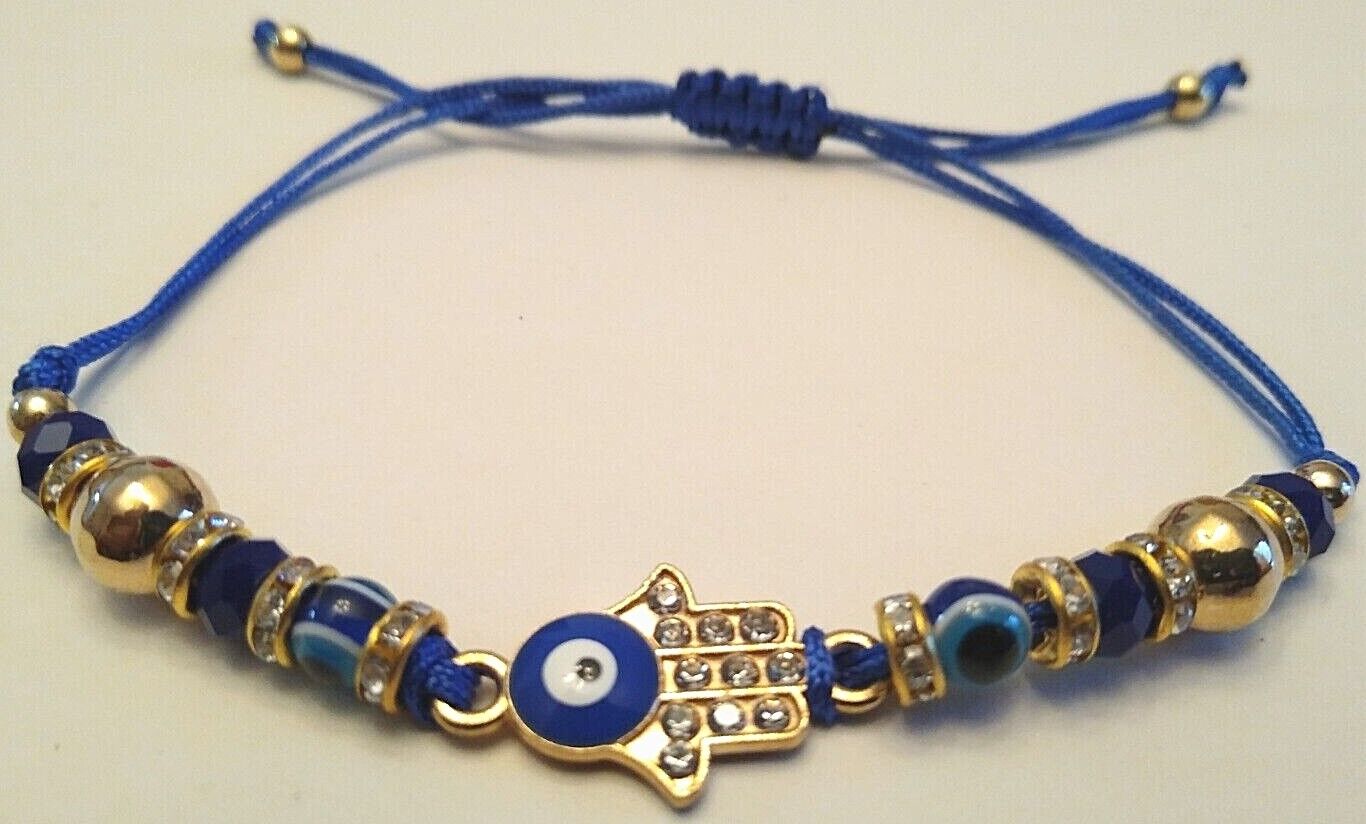-40%
ADJUSTABLE FAIR TRADE TIBETAN BUDDHIST 8 AUSPICIOUS LUCKY SYMBOLS BRACELET NEPAL
$ 13.17
- Description
- Size Guide
Description
EXTREMELY UNIQUE adjustable SILVERY TIBETAN BUDDHIST 8 AUSPICIOUS LUCKY SYMBOLS ADJUSTABLE BRACELET NEPALvery unique Tibetan Buddhist theme bracelet with familiar (to Tibetan Buddhists) 8 Auspicious (lucky) symbols or "Åshtamangala" in Sanskrit
FAIR TRADE from Nepal
outer medallions show representation of 8 symbols, plus an ornate bonus medallion on each end with inlaid turquoise or red stones
inner medallions show double dorje motif, plus a medallion on one end that says "made in Nepal"
each medallion measures approximately 3/8" & they are 7 sided
semi-rigid, due to double layer of silver tone medallions that are securely welded together OVER TOP of doubled very sturdy black
adjusts from 8" to 6 1/4"; will not fit over a large hand
a similar bracelet is also available, in another listing, with Om mani peace mantra
to view more information about the 8 Auspicious Symbols, please see below
***
Buy With Confidence:
We are practicing Buddhists
We respect the importance of these religious materials
We use the same products that we sell
USA-based
***
History, Legend and Lore of Copper
use by humans is a long and varied, dating back nearly 10,000 years with multiple applications. Copper is, in fact, humanity’s first metal and shows up in Sumerian and Egyptian metallurgy circa 3900 BC.
This mineral can combat lethargy, passivity, restlessness, excitability and non-acceptance of oneself. It stimulates initiative, optimism, diplomacy and independence. It emits a philosophic energy, free of orthodoxy and bias. Copper provides a harmonic connection between the physical and astral bodies and aligns the subtle bodies. It has been used successfully to amplify and transmit thought. It is said to be a
bestower of good
, bringing benefit to its wearer. It opens an activates the base and sacral chakras, advancing and stabilizing the the energies of intuition, sexuality, desire and vitality. It allows one to recognize the barriers which are in the path of ones development.
Copper has been used through the ages to alleviate a variety of health related problems, on all continents and throughout most cultures.
Although the anti-bacterial and anti-fungal properties of copper have been recognized since ancient times, modern science is now expressing an increased interest into the function of copper in human health.
In modern times, copper is becoming more widely recognized for its effectiveness in the treatment of a number of internal diseases including anemia, cancer, rheumatoid arthritis, stroke and heart disease.
Current research is confirming the role of normally ingested copper in the prevention and moderation of disease. Much of this research is based upon an improved understanding of the role of copper in the human body, i.e., its role as an essential trace element needed for healthy growth and function of bones and collagen, the brain, the heart, the skin and immune system.
***
THE EIGHT AUSPICIOUS SYMBOLS
This set of symbols is very popular in Tibet,
but are also known in Sanskrit as 'Ashtamangala', ashta means eight and mangala means auspicious.
The
Umbrella or parasol
embodies notions of wealth or royalty, for one had to be rich enough to possess such an item, and further, to have someone carry it. It points to the "royal ease" and power experienced in the Buddhist life of detachment. It also
symbolises the wholesome activities to keep beings from harm (sun) like illness, harmful forces, obstacles and so forth, and the enjoyment of the results under its cool shade.
The
Golden Fish
; were originally symbolic of the
rivers Ganges and Yamuna, but came to represent good fortune in general, for Hindus, Jain and Buddhists. Within Buddhism it also symbolises that living beings who practice the dharma need have no fear to drown in the ocean of
suffering, and can freely migrate (chose their rebirth) like fish in the water.
The
Treasure Vase
; is a sign of the inexhaustible riches available in the Buddhist teachings, but also symbolises long life, wealth, prosperity and all
the benefits of this world. (There is even a practice which involves burying or storing treasure vases at certain locations to generate wealth, eg. for monasteries or dharma centers.)
The
Lotus
is
a very important symbol in India and of Buddhism. It refers to the complete purification of body, speech and mind, and the blossoming of wholesome deeds in liberation. The lotus refers to many aspects of the path, as it grows from the mud (samsara), up through
muddy water it appears clean on the surface (purification), and finally produces a beautiful flower (enlightenment). The white blossom represents purity, the stem stands for the practice of Buddhist teachings which raise the mind above the (mud of)
worldly existence, and gives rise to purity of mind.
An open blossom signifies full enlightenment; a closed blossom signifies the potential for enlightenment.
The right-turning
Conch
, which is also used as
a horn, symbolises the deep, far reaching and melodious sound of the teachings, which is suitable for all disciples at it awakens them from the
slumber of ignorance to accomplish all beings' welfare.
The
Auspicious
or
Endless Knot
is a geometric diagram which symbolises the nature of reality where everything is interrelated and only exists as part of a web of karma and its effect.
Having no beginning or end, it also represents the infinite wisdom of the Buddha, and the union of compassion and wisdom. Also, it represents the illusory character of time, and long life as it is endless.
The
Victory Banner
; symbolises the victory of the Buddha's teachings over death, ignorance, disharmony and all the negativities of this world, and victory over. The roofs of Tibetan monasteries are often
decorated with victory banners of different shapes
and sizes.
The
Dharma-Wheel
(Dharmachakra); it is said that after Siddharta Gautama achieved enlightenment, Brahma came to him, offered a Dharma-Wheel and requested the Buddha to teach. It represents the
Buddhist teachings.
View more great items



















